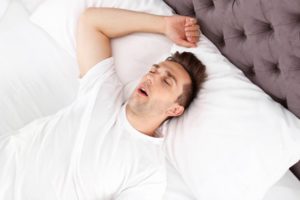There are several things that you inherit through genetics: almost every characteristic from the color of your eyes and hair to the length of your nose is determined by your genes! But did you know that you can also inherit certain problematic conditions through genetics, such as sleep apnea? Here’s more from your sleep dentist in Covington about how your genes can contribute to this condition and some ways you can actively lower your risk.

How Genetics Can Contribute to Sleep Apnea
Obstructive sleep apnea (OSA) is a chronic condition that’s characterized by repeated pauses in a patient’s breathing throughout the night. This happens when there’s blockage in the airway, often due to the soft tissues of the throat and mouth collapsing. This blockage can stem from a variety of reasons, many of which are lifestyle-related; however, it can also be the result of genetics. Here are a few ways in which your genes can contribute to sleep apnea:
- Body fat – Your genes can influence your weight and also determine where fat is located on your body, both of which can influence your likelihood of developing sleep apnea. In fact, people who are obese are roughly ten times more likely to suffer from OSA!
- Facial anatomy – Your genes also affect the shape of your face, including skull width, nose length and width, and facial depth. All of these parts impact how wide your airway is, which in turn influences how easily it can become blocked.
- Circadian rhythm – Your natural sleep schedule is heavily influenced by your genes, as is the quality of your sleep.
- Breathing control – Research on the link between genes and breathing control is still somewhat incomplete, but experts suspect that genetics might influence the muscles and neural signals that are involved in breathing.
Lowering Your Risk of Sleep Apnea
Being genetically predisposed to sleep apnea does not mean you’re entirely helpless against it; in fact, there are still several things you can do to actively mitigate your chances of developing it. Consider the following:
- Maintain a healthy weight by eating a vitamin-rich diet, avoiding sugary and starchy foods, and getting plenty of exercise.
- Make other lifestyle choices that promote healthy breathing during sleep, such as not drinking alcohol in excess before bedtime and refraining from smoking or using tobacco.
- Be mindful of other potential sources of sleep disruption such as light entering the room, warmer or cooler temperatures, pet dandruff, and seasonal allergies.
- If you suffer from dental misalignment, oral appliance therapy can assist with correcting your jaw’s position, resulting in better airflow. You might also consider sleeping on your back rather than your side to promote easier breathing.
If you’re concerned about how sleep apnea might be impacting your ability to rest, don’t hesitate to speak with your sleep dentist about possible solutions; even if the causes are genetic, you can still do something about it!
About the Author
Dr. James A. Moreau Jr. received his DDS from the Louisiana State University School of Dentistry and is a proud Diplomate of the American Board of Dental Sleep Medicine and a Fellow of the prestigious Academy of General Dentistry. His practice in Covington is happy to offer a wide range of sleep apnea treatments. If you have any questions about sleep apnea or would like to arrange a consultation, don’t hesitate to visit the practice’s website or give them a call at (985) 888-0668.
